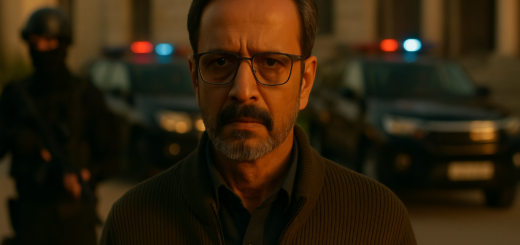Stolen Movie Review: A Detailed Analysis

Stolen delivers a sharp, socially relevant thriller that blends gripping storytelling with a deep examination of class divides in modern India. The film’s strong performances, intense pacing, and bold direction have captured attention globally. Premiering first at international festivals and later securing an OTT release, Stolen stands as a bold example of how Indian cinema continues evolving beyond conventional narratives.
Plot and Setting
The story unfolds in the remote railway towns of Rajasthan. A newborn baby gets abducted from a train station while her mother, Jhumpa, briefly falls asleep. Two urban brothers, Gautam and Raman, witness the abduction but fail to prevent it. The local police and villagers quickly turn their suspicion toward the brothers, accusing them of involvement in the kidnapping. Without any solid evidence, the authorities struggle to maintain order as public hysteria fuels mob justice.
Gautam and Raman become entangled in the investigation. Gautam initially displays hesitation, driven by his privileged background and self-preservation instincts. In contrast, Raman refuses to step away from the unfolding crisis and demands accountability. As the search intensifies, both brothers assist Jhumpa in the hunt for her missing child while confronting deeply ingrained social inequalities.
The plot progresses in real-time, packing relentless suspense into a tight 90-minute runtime. Scenes involving chaotic chases across barren landscapes heighten the story’s urgency. Long, unbroken takes immerse viewers directly into the characters’ desperation. The constant threat of mob violence and official corruption intensifies the tension, while illegal baby trafficking adds a haunting layer to the narrative.
Performances and Character Development
Abhishek Banerjee, portraying Gautam, leads the cast with a career-defining performance. His portrayal charts a clear transformation from reluctant observer to a man who accepts moral responsibility. Abhishek skillfully balances moments of fear, guilt, and redemption without resorting to melodrama.
Shubham Vardhan plays Raman, Gautam’s younger brother, and delivers an equally compelling performance. Raman’s unflinching sense of justice anchors the narrative as he refuses to abandon the helpless mother or compromise his principles. His firm stance stands in stark contrast to Gautam’s initial hesitancy, creating dynamic tension between the siblings.
Mia Maelzer portrays Jhumpa, the mother whose child gets stolen. She embodies both vulnerability and strength, depicting a mother’s anguish with gut-wrenching honesty. Her performance serves as the emotional heart of the film. Harish Khanna and Sahidur Rahaman add further authenticity as law enforcement officers torn between systemic constraints and personal conscience.
The cast members maintain emotional restraint throughout, amplifying the film’s realism. Every tear, scream, or moment of silence contributes to the palpable tension without over-dramatization.
Themes and Social Commentary
Stolen confronts issues of mob justice, socio-economic disparity, and systemic apathy without moralizing. The film does not portray any character as a typical hero or villain; instead, it presents complex individuals navigating a flawed system.
Mob violence emerges as a central theme. Villagers, fueled by fear and frustration, abandon due process in favor of public vengeance. These chaotic scenes mirror real-life incidents where public suspicion often leads to false accusations and irreversible consequences. Through Gautam’s ordeal, the film exposes the dangers of unchecked hysteria.
Class divides remain equally central. Gautam’s urban privilege initially shields him from accountability, but his transformation underscores the importance of empathy across economic lines. Jhumpa, marginalized and voiceless, represents countless individuals ignored by institutions meant to protect them.
The narrative exposes police inefficiency and corruption without resorting to caricature. Law enforcement officers struggle between maintaining order and placating violent mobs, highlighting the institutional weaknesses often seen in such cases.
Despite these bleak themes, the film maintains a sliver of hope. The story emphasizes that humanity and compassion can still prevail amid chaos and fear.
Critical Reception and Audience Response
Critics widely praised Stolen for its tightly woven narrative, socially conscious themes, and outstanding performances. Reviewers have compared the film to acclaimed Indian thrillers like NH10, citing its similar intensity and social relevance.
Many critics applauded Abhishek Banerjee’s layered portrayal of Gautam, calling it his most mature work to date. Shubham Vardhan’s portrayal of Raman earned praise for its sincerity, while Mia Maelzer’s emotionally raw performance as Jhumpa drew consistent admiration.
Audience reactions have also echoed these sentiments. Viewers recognized the film’s ability to balance emotional depth with thrilling suspense. The realistic depiction of mob violence and class conflict resonated deeply, especially among Indian viewers familiar with similar real-life situations.
Social media discussions described the film as a conversation starter rather than mere entertainment. The film’s pacing, character development, and cinematography earned particular appreciation.
International Recognition and Festival Success
Stolen achieved significant success at international film festivals before reaching mainstream audiences. The film premiered at the Venice International Film Festival in the Orizzonti Extra section, where it garnered significant attention.
Following Venice, the film received awards at the Beijing International Film Festival, including Best Director, Best Actress, and Best Cinematography. It also secured accolades at the Skip City Film Festival in Japan, where it won Best Film and Best Director. The Zurich Film Festival awarded the film a Special Mention for its powerful storytelling and social relevance.
These honors highlight the film’s universal appeal. Audiences and critics across cultural lines recognized the film’s unflinching portrayal of injustice and resilience.
OTT Release and Business Model
The producers opted for an OTT release through Amazon Prime Video on June 4, 2025. This strategy allowed the film to reach a global audience immediately, bypassing the risks and costs of a traditional theatrical release.
The streaming model proved highly successful. High viewership within days of release indicated strong demand, particularly among viewers seeking socially conscious thrillers. Industry analysts described the film’s online performance as equivalent to a ₹100 crore theatrical success, considering the global reach and sustained viewer engagement.
The OTT strategy also generated organic buzz through social media and online reviews, drawing attention without the need for an extensive marketing budget.
Direction, Technical Aspects, and Cinematic Execution
Director Karan Tejpal crafted a taut, immersive experience with Stolen. Originally conceived as a one-take film, the final product preserves that vision’s intensity through long, uninterrupted scenes that sustain the narrative’s urgency.
Cinematographer Ishaan Ghosh captured Rajasthan’s harsh terrain with stark realism. The camera work mirrors the story’s tension, using wide shots to emphasize isolation and close-ups to capture emotional vulnerability.
The editing team maintained momentum throughout the 90-minute runtime, ensuring that the narrative never lost focus or pacing. The minimal background score, composed by Arpad Bondy and Ashish Prabhu Ajgaonkar, underscored key moments without overwhelming the film’s realism. Sound design played a crucial role, using ambient noise like train whistles, hurried footsteps, and frantic whispers to enhance the sense of dread.
Final Verdict
Stolen succeeds as a rare blend of gripping thriller and impactful social commentary. The film challenges viewers to confront uncomfortable realities while keeping them on the edge of their seats. Outstanding performances, careful direction, and socially relevant storytelling ensure that Stolen will remain one of the standout Indian films of 2025.
By placing class conflict, mob psychology, and systemic failures at the forefront, the film refuses to offer easy answers. Instead, it demands introspection and empathy, qualities that make its message linger long after the credits roll.













